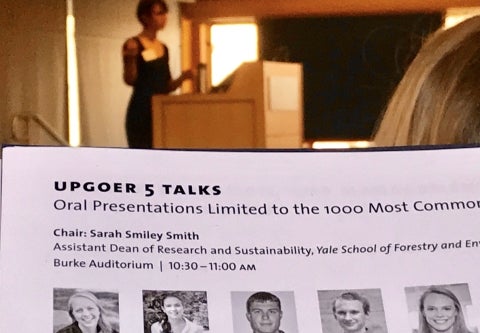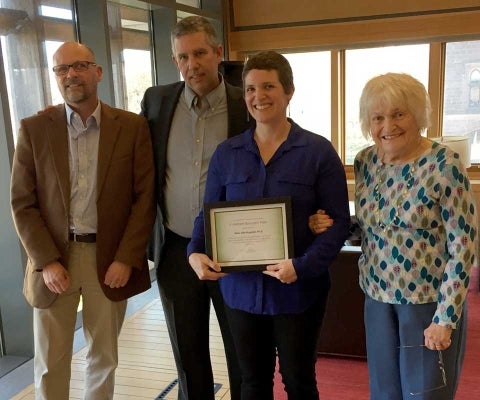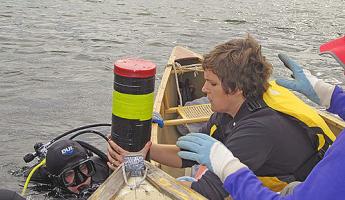Note: Yale School of the Environment (YSE) was formerly known as the Yale School of Forestry & Environmental Studies (F&ES). News articles and events posted prior to July 1, 2020 refer to the School's name at that time.

Forty-nine master’s students, doctoral students, and postdocs from the Yale School of Forestry & Environmental Studies (F&ES) community presented their research during the 34th annual F&ES Research Conference held at Kroon Hall on April 20.
In a day-long series of events the researchers highlighted their innovative, original scholarship in a range of different formats, including panel discussions, short oral presentations, and poster sessions.
Four doctoral candidates delivered oral presentations in “Up-Goer Five-speak” — or, using language limited to the 1,000 most common words (or, in ten-hundred words; “one-thousand’ is not among of the most common words), an exercise that promotes simpler science communication.
The various formats allowed presenters to share their research in a range of dynamic settings and built around specific themes — and to crowded rooms.
“The conference was a great success,” said Julia Monk, a doctoral candidate and co-organizer of the conference. “It’s such a great opportunity to see what other people at F&ES are doing. That’s one of the benefits of being at an interdisciplinary school and program: you get exposed to all these radically different fields but when you’re in the midst of your research you don’t always interact with those other fields or researchers.”
“So it’s great to bring everyone in the community together.”
In addition to integrating master’s and doctoral researchers, the events once again involved faculty and staff members — including representatives from the School’s centers and programs — who served as panel moderators and judges.

F&ES Professors Oswald Schmitz, left, and David Skelly, Mary Rogalski ’15 Ph.D., and Chris Bormann.
During the conference the School awarded Mary Rogalski ’15 Ph.D. the fifth annual F. Herbert Bormann Prize, which honors an F&ES doctoral student whose work best exemplifies the late professor’s legacy of interdisciplinary research by creating insights into the relationship between humans and the environment.
Using “resurrection ecology” and lake sediment archives, Rogalski was able to determine that a tiny freshwater crustacean, known as Daphnia, actually became more sensitive to heavy metals as concentrations increased over time— contrary to her expectations.
“Today we almost take for granted the really important connections that Professor Bormann was making,” said Rogalski, who met Bormann while she was beginning graduate school. “While I was initially surprised to receive the prize, it does make sense because this work tries to connect atmospheric pollution, watersheds, ecology, evolution, and how humans are affecting all of that.
“I suppose it’s a next step that builds on the ideas he developed. This recognition is a great honor.”
Deepti Chatti, a doctoral candidate who described the epistemic and ethical challenges in development research in the Global South, received the Oswald Schmitz Award for Excellence in Research Communication, which honored the best communications among doctoral researchers.
Annie Stoeth ’18 M.E.Sc., who presented her findings on the relationship between plastic waste and invertebrate species in urban ecosystems, received the Best Talk Award among master’s degree students.
Adam Eichenwald ’18 M.E.Sc., who studied patterns of ptarmigans, a bird in the grouse family, due to predation risk from gyrfalcons, received the award for best poster.
Delivering the keynote address was Cynthia Malone, a doctoral candidate in the Department of Geography and Planning at the University of Toronto, who discussed how the construction of existing human-nature relations reproduce racism — and how they have been challenged by Black radical scholarship and movement.
For the first time, conference organizers invited local high school students participating inYale’s Pathways to Science program, a Yale project that encourages and supports promising young scholars to pursue careers in the sciences. During the conference the nine students met with presenting researchers and met with Cynthia Malone for a lunch discussion.
